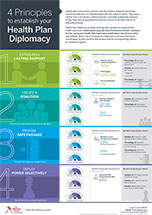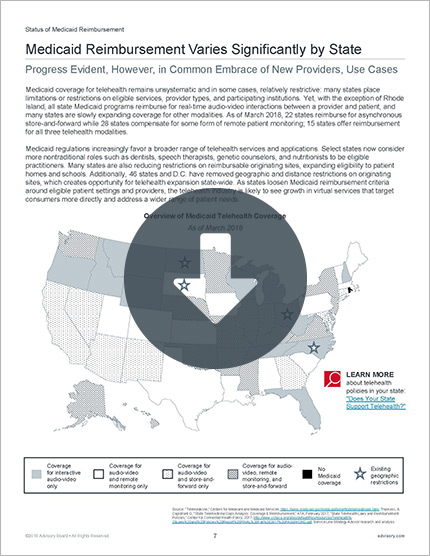Auto logout in seconds.
Continue LogoutFaced with low reimbursements—or flat-out denials—from dental insurers, dentists are learning to bill medical insurers for some of the services they provide, David Tuller reports for Kaiser Health News.
Health Insurance 101: Get the slide decks
Low reimbursement for dental services
While dental insurance covers standard procedures such as cleanings and fillings, even insured patients can face thousands of dollars in out-of-pocket costs for major dental work like crowns and root canals—which are typically covered at just 50%. Most intensive procedures, such as implants, aren't covered at all.
Medical insurance, on the other hand, usually offers more generous coverage, according to Tuller. The difference in the insurance coverage for expensive and routine procedures leaves dentists with low reimbursement rates, which Tuller writes can affect revenue.
Dentists learn the trick of medical billing
Given low dental reimbursements, billing medical insurers for medically necessary services is a "growing trend" among dentists, Tuller reports.
Take California dentist Chris Farrugia, for example.
A few years ago, Farrugia had an epiphany after he purchased a CT scanner for more than $100,000. "It occurred to me that [the scanner] was a medical device," he said. "I'm a licensed health care provider, I'm providing this within the scope of my license. They can't discriminate against me."
So Farrugia decided to bill medical insurance for the scans. And it worked.
Farrugia discovered that, because CT scans are medically necessary, he could bill medical insurance for a higher reimbursement rate than dental insurers would provide. Now, Farrugia bills medical plans $744 for each CT scan and usually receives $500 in reimbursement. Dental insurance, by contrast, would reimburse $125—if it's covers anything at all.
Farrugia's interest in medical billing didn't stop at the CT scans. After doing some research, Farrugia found that medical insurance would cover several services dentists provided.
Revenue for Farrugia's practice increased by almost 10% one year after he implemented medical billing, Tuller reports.
What dental services count as billable medical services?
At a conference earlier this year, Farrugia shared his lessons learned with other dentists and dental office .
"There is a medical part of our practice and a dental part," Farrugia said at the seminar. "You have teeth, [and] you got the 'other stuff.' It's the other stuff that medical insurance pays for." The "other stuff," Farrugia explained, includes full head, neck, and mouth exams and oral problems relate to an underlying medical condition.
The California Dental Association also lists dental repair due to injury, treatment for infection and inflammation, and some periodontal surgeries as "medically necessary" procedures that can be billed to medical insurers.
Rashpal Deol, a dentist who attended the seminar said Farrugia's approach made sense. "We look at the soft tissues in the mouth, the muscles, the bone, the TM [temporomandibular] joint, and the head and neck area," Deol said. "You always check the lymph nodes, we do oral cancer screening, so that is a comprehensive medical exam."
In fact, consulting firms and speakers are advising dentists to think of themselves as "physicians of the mouth" to bill medical insurers for services.
But while some dentists and officer employees are eager to make changes, others are intimidated by the process of medical coding. Kelly Bradshaw, a staff a California dental practice, said, "People go to school to learn medical coding." She added, "To try to bridge that gap in order to help our patients is intimidating. You have to be open-minded to look at things in different ways."
AHIP: We're watching for abuse
Kristine Grow, a spokesperson for AHIP acknowledged that medical insurance can cover some dental procedures but warned that medical insurers are always watching for abuse. "It's important to note that procedures not related to an emergency event or trauma may not be medically necessary, and therefore would not be covered by medical insurance," she said (Tuller, Kaiser Health News, 9/24).
Health Insurance 101: Get the slide decks
Confused about the U.S. health insurance system? You're not alone—it's one of the most complicated systems in the world. If you missed our recent webconference series diving deep into the system, don't worry; we've got you covered.
Review the slide decks from our recent webconferences for a quick overview of each program:
Don't miss out on the latest Advisory Board insights
Create your free account to access 1 resource, including the latest research and webinars.
Want access without creating an account?
You have 1 free members-only resource remaining this month.
1 free members-only resources remaining
1 free members-only resources remaining
You've reached your limit of free insights
Become a member to access all of Advisory Board's resources, events, and experts
Never miss out on the latest innovative health care content tailored to you.
Benefits include:
You've reached your limit of free insights
Become a member to access all of Advisory Board's resources, events, and experts
Never miss out on the latest innovative health care content tailored to you.
Benefits include:
This content is available through your Curated Research partnership with Advisory Board. Click on ‘view this resource’ to read the full piece
Email ask@advisory.com to learn more
Click on ‘Become a Member’ to learn about the benefits of a Full-Access partnership with Advisory Board
Never miss out on the latest innovative health care content tailored to you.
Benefits Include:
This is for members only. Learn more.
Click on ‘Become a Member’ to learn about the benefits of a Full-Access partnership with Advisory Board
Never miss out on the latest innovative health care content tailored to you.


